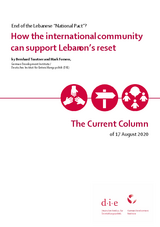End of the Lebanese “National Pact”?
How the international community can support Lebanon’s reset
Trautner, Bernhard / Mark FurnessThe Current Column (2020)
German Development Institute / Deutsches Institut für Entwicklungspolitik (DIE), The Current Column of 17 August 2020
The Lebanese people and the international community all agree that Lebanon cannot be allowed to fail in the wake of the devastating explosion in the Port of Beirut. There are many reasons for this unanimity. The Lebanese want a properly functioning state at last, instead of one that cannot provide security or collect rubbish from the streets. The country has taken in over one million Syrian refugees, who have nowhere else to go. Lebanon is also a hub and regional base for many development and humanitarian support measures and international organisations.
The government's resignation does not signal a fresh start and political renewal is no foregone conclusion. Ever since the nation gained independence in 1943, previous governments have considered the state primarily as a source of plunder. A system of proportional representation for sectarian groups was enshrined in the Lebanese Constitution. Despite being dubbed the “National Pact”, this system has prevented the emergence of a political class oriented toward the nation as a whole. The confessional system, which made peace after the civil war by sharing out power between Sunnis, Shia and Christians, has become increasingly ossified and plagued by clientelism and considerable economic and political corruption.
Lebanon’s international partners are facing a dilemma. On the one hand, international support for reconstruction requires legitimate state partners. This is especially true when it comes to establishing sustainable infrastructure, something for which the Lebanese demonstrators have been calling for since long before the disaster in Beirut. Countries wishing to sign a loan agreement with an international financial institution for reconstruction assistance require a national government to assume pro forma responsibility.
On the other hand, the more support the international community pledges to Lebanon, the bigger the cake to be shared among the political leadership. As has been the case in the past when governments have fallen, there is concern that sectarian leaders are only coming together to bring about new elections and install another technocratic government, which they will control. German Foreign Minister Maas has rightly said that political leaders have to finally take the concerns of the population seriously, and he has made this a condition for state reconstruction assistance
The disaster nevertheless offers Lebanon an opportunity to undertake careful but crucial reforms. For instance, basic social protection schemes in the country could be progressively transferred away from the confessional groups (although they would most likely resist this) in order to become a collective national responsibility. Financed by international donors and implemented jointly by the World Food Programme (WFP) and local administrations, the system providing direct basic financial security for refugees and host communities could be more broadly extended across Lebanese society and eventually financed by the Lebanese state itself. This would be more equitable and also more efficient than the largely non-targeted subsidisation of food or fuel carried out at present by most governments in the Middle East region.
Lebanon’s international partners also need to proceed carefully and could build on initiatives that are already working. Initially, there is only a limited need for state structures when it comes to providing the emergency aid and transitional assistance now required. Due to the Syrian crisis, there are many other international organisations in the country besides the WFP. For example, the United Nations Children's Fund (UNICEF)’s work in the education sector had been coordinated closely with the Lebanese Government up until now. Nonetheless, it has sufficient contacts at administrative level to manage tasks such as needs assessment, project planning and financing for the renovation of schools in Beirut.
The provision of support via international non-governmental organisations has also proven effective. Organisations such as Germany’s Welthungerhilfe (formerly German Agro Action) pass on private donations and government grants to trusted local partners in the country and assist these partners with designing and implementing projects. International donors can capitalise on the fact that Lebanon has a relatively free and effective civil society and, by regional standards, high degrees of press freedom and public debate, which helps ensure a certain level of oversight over the way funds are used.
The devastating explosion in the Port of Beirut has vividly illustrated just how life-threatening the ailing National Pact, segmented along sectarian lines, has become. A new social contract must emerge from within Lebanese society itself, and Germany and other international partners need to be prepared to support local civil society actors, who are the agents of political renewal and the ones keeping watch to ensure that the reconstruction of Beirut leads to a genuine reset for the whole country.



